Table of Contents
Did you know that what you eat could help protect you from cancer? After all, we’ve all heard the phrase “You are what you eat.” In fact, studies have shown that 30 to 50 percent of all cancer cases could be prevented with a healthy diet and lifestyle (1).
This is good news for those looking to improve their longevity! You can take a proactive approach to a healthier future by including these cancer-fighting superfoods in your diet.
Here, we will explore some cancer-fighting foods, focusing strongly on mushrooms. We will also discuss the latest studies and findings in nutrition and cancer prevention. By the end, you’ll have a deeper understanding of how your diet, particularly mushrooms, can significantly reduce cancer risk and enhance overall wellness.
How can mushrooms reduce cancer risks?
Mushrooms are more than just a tasty addition to your meals. They are nutritional powerhouses that provide essential vitamins, minerals, and antioxidants.
Additionally, mushrooms contain compounds like polysaccharides and beta-glucans, which can have great medicinal properties, such as fighting cancer (2).
Several types of mushrooms have been studied for their ability to inhibit cancer cell growth and strengthen your immune system, helping you combat cancer cells. Let’s take a look at these mushrooms.
Types of mushrooms with anti-cancer properties
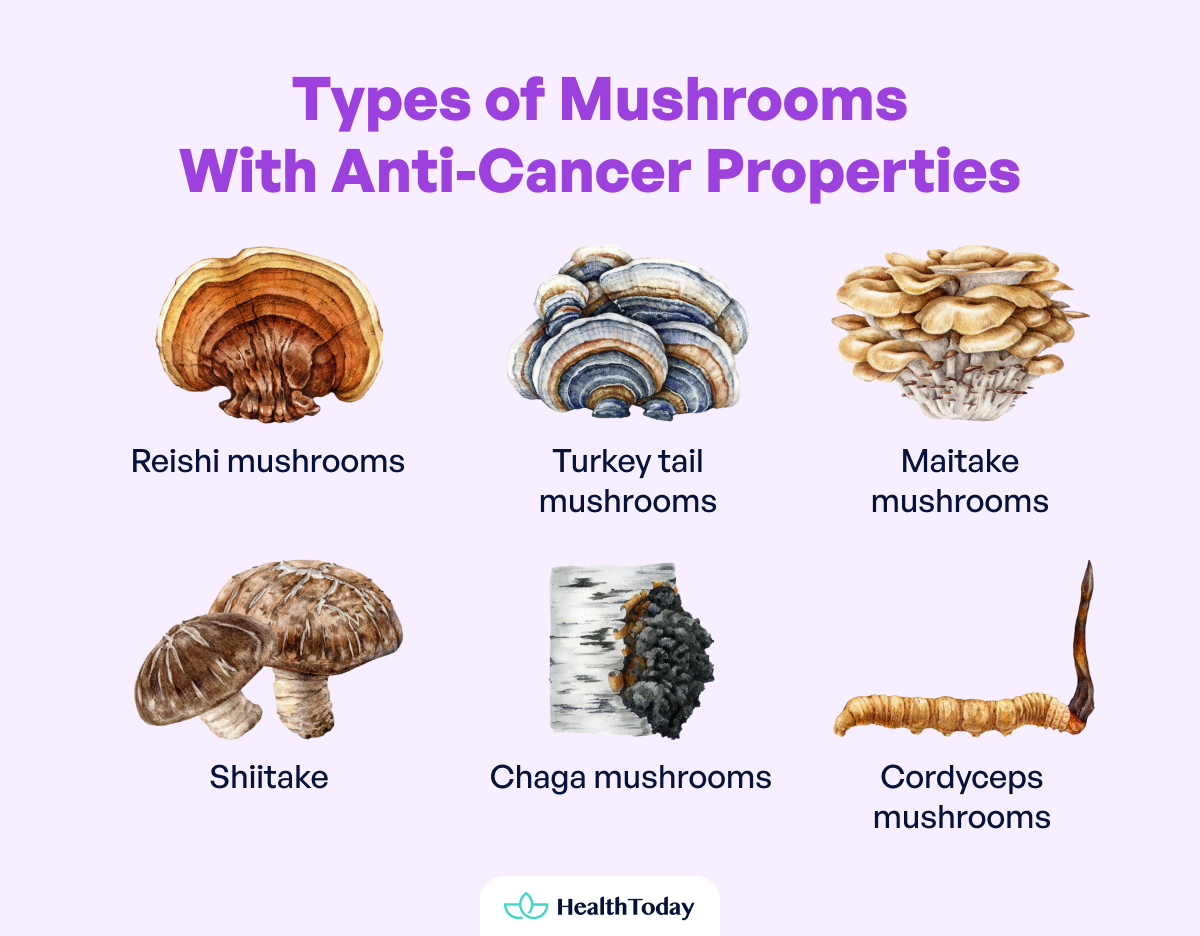
Reishi mushrooms
Reishi mushrooms, often called the “mushroom of immortality,” have been used in traditional Chinese medicine for over 2,000 years. These mushrooms contain bioactive compounds like polysaccharides and triterpenoids, which are known to boost the immune system and help fight cancer (3).
Extracts from Reishi mushrooms may inhibit the proliferation of cancer cells and promote apoptosis (the process of programmed cell death) (3).
In addition, these mushrooms have antioxidant and anti-inflammatory properties, adding a protective layer as one of the foods that fight cancer cells.
While there is evidence that extracts and medicines from reishi mushrooms have beneficial effects, the impact of eating Reishi mushrooms is still unclear (30).
Turkey tail mushrooms
Turkey tail mushrooms, or Trametes versicolor, are known for their vibrant colors and impressive medicinal properties. These mushrooms are rich in polysaccharides, especially polysaccharide-K (PSK) and polysaccharide-peptide (PSP), which are known for their anticancer effects (4).
It has been shown that PSK and PSP can also help enhance immune function (5). These compounds may help recognize and attack cancer cells more effectively.
In fact, a large 2022 study with over 10,000 participants demonstrated that PSK can improve the survival rates of patients with gastric cancer who have undergone gastrectomy. The benefit occurs when PSK is used alongside conventional treatments like chemotherapy (6).
Maitake mushrooms
Maitake mushrooms, also known as “hen of the woods,” not only provide a delicious taste to your meals but might also help shrink tumors.
These mushrooms contain beta-glucans, complex polysaccharides that the evidence suggests may help activate the immune system and inhibit cancer cell growth (2).
These mushrooms may help regulate blood sugar levels, enhance immune function, and reduce tumor growth (7, 8).
A study of breast cancer cells showed that maitake extract could help suppress cancer-like tumor genes, stimulate apoptosis (cell death), and inhibit cancer cell growth (8). However, more human studies are needed to clearly delineate the link between maitake mushrooms and cancer.
Shiitake
Besides adding umami flavor to your meals shiitake mushrooms may also be a powerful food that kills cancer cells (9).
They contain lentinan, which may help stimulate the immune system. It has been shown that the components in shiitake helped prolong the survival rate among patients with advanced gastric cancer (10).
A study found that patients with advanced gastric cancer who received lentinan during chemotherapy had better survival rates compared to those who did not receive it. (11). This highlights the potential of shiitake mushrooms as a complementary therapy in cancer treatment.
Chaga mushrooms
Chaga (Inonotus obliquus) mushrooms are rich in antioxidants and other bioactive compounds contributing to their anticancer properties. That is why they have been used for centuries in traditional medicine (12).
Some studies have shown that chaga mushroom components can slow the growth of cancer cells, reduce inflammation, and enhance immune function (13). Their high antioxidant content helps protect cells from oxidative stress.
Oxidative stress occurs when there are too many free radicals in the body. These unstable molecules can damage DNA (among other things) and increase the risk of cancer development.
Cordyceps mushrooms
Finally, cordyceps is another mushroom containing strong bioactive compounds known as cordycepin and polysaccharides, which have anticancer effects. Cordycepin may help initiate cell death and provide anticancer properties (14).
However, the mechanisms of this effect are still unknown. Therefore, more research is needed to determine the role of cordyceps in cancer treatment.
Are mushrooms anti-carcinogenic foods?
As we’ve seen, mushrooms’ anti-carcinogenic properties are well-documented. They contain numerous compounds that can inhibit cancer cell growth and boost immune function.
However, most research has focused on protein extracts and isolated compounds from mushrooms. For that reason, it is still unclear how consuming whole mushrooms might help prevent and fight cancer cells.
While some health professionals often recommend including mushrooms in your diet to increase your antioxidant levels. However, more research is needed to fully understand the relationship between mushrooms and anticancer activity.
If you decide to opt for mushroom-based supplements to increase your mushroom intake, make sure you speak with a health professional. They can help you determine if you can take these supplements and at what doses.

Best cancer-fighting foods and spices
As for the best cancer-fighting foods and spices, make sure to include several cancer-fighting fruits and vegetables in your daily diet.
These powerful foods not only help reduce the risk of cancer but are also recognized for their tumor-shrinking properties.
Below, we will examine some of the best fruits for cancer and other foods that kill cancer cells.
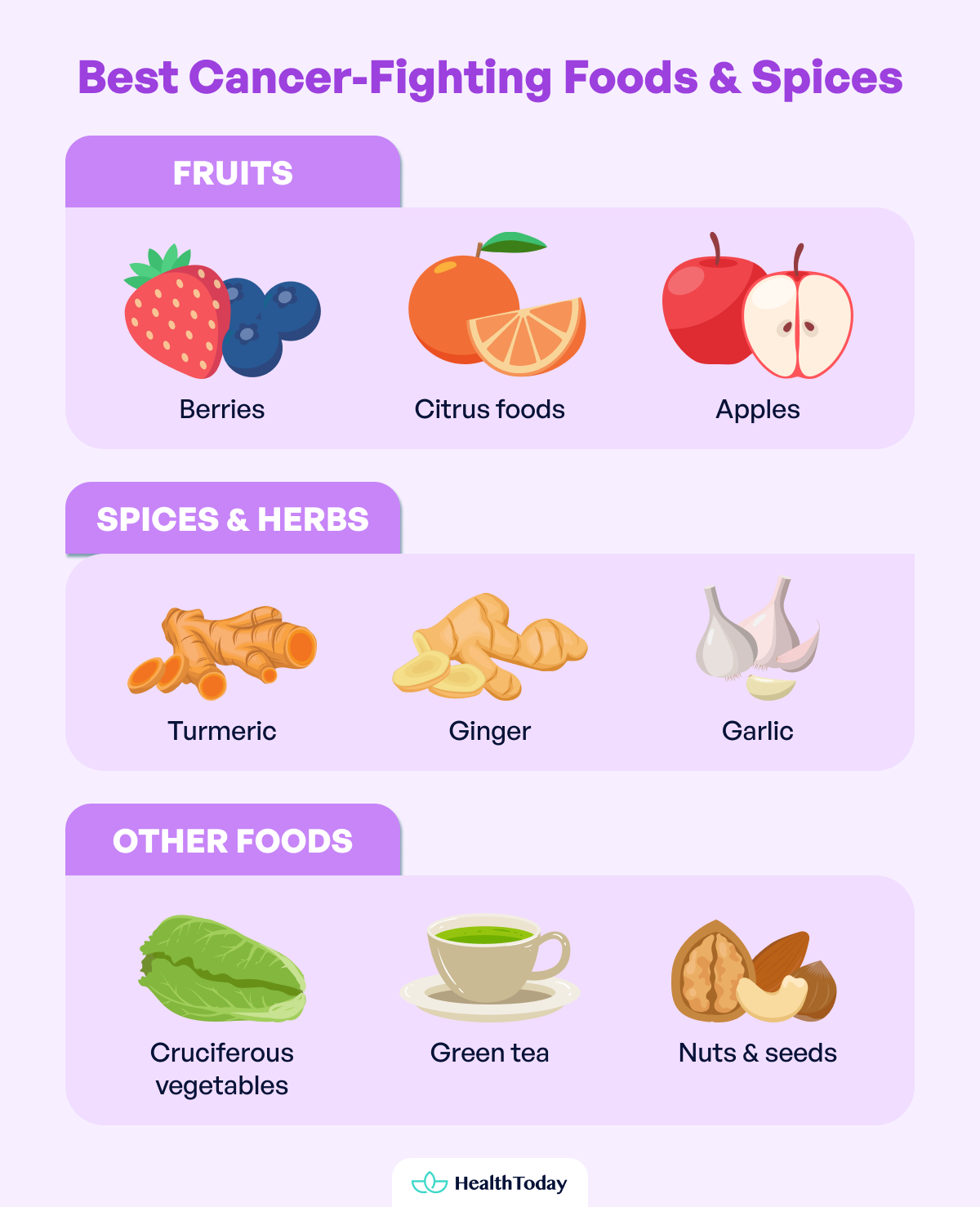

Fruits that fight cancer
Fruits are not just a delicious and refreshing snack. They are packed with powerful antioxidants and nutrients that may help you fight cancer. So, what are the top three cancer-fighting fruits?
- Berries: Strawberries, blueberries, raspberries, and other berries are rich in antioxidants like vitamin C and quercetin. These compounds help neutralize free radicals in the body, reducing oxidative stress and lowering cancer risk (15). Berries are also high in fiber, which supports digestive health and reduces the risk of colorectal cancer (16).
- Citrus foods: Oranges, lemons, and grapefruit are packed with vitamin C and flavonoids, which have been shown to inhibit cancer cell growth (17). However, remember that many studies related to vitamin C and cancer have used high doses of vitamin C. Additionally, citrus fruits also contain limonoids, compounds that have been found to promote detoxification and support immune function in fighting cancer (18).
- Apples: Apples are another great cancer-fighting fruit. They are rich in fiber, vitamin C, phenolic compounds, and triterpenoids. Studies suggest that the antioxidants in apples can help prevent cell damage and reduce the risk of developing cancers, particularly in the breast, colon, and stomach (19). Still, more research is needed to determine the exact effect of apples on cancer cells.
Spices and herbs that fight cancer
Many herbs and spices contain bioactive compounds that can help prevent and fight cancer. Here are a few herbs that you should consider adding to your diet:
- Turmeric: Turmeric contains curcumin, a compound with powerful anti-inflammatory and antioxidant properties. Curcumin has been shown to block cancer cell growth and even trigger apoptosis in certain types of cancer in the lab (20).
- Ginger: Ginger is another powerful herb with cancer-fighting properties. It contains gingerol and other bioactive compounds that have been found to reduce inflammation and inhibit the growth of cancer cells both in lab and in human studies (21).
- Garlic: It contains sulfur compounds that have been shown to boost immune function and reduce the risk of several cancers, including stomach, colorectal, and prostate cancer, while also improving outcomes (22).
Other foods that help with cancer
Apart from fruits and herbs, several other foods have been identified for their cancer-fighting properties. Here are some delicious yet healthy options you may want to include next time you make your meals.
- Cruciferous vegetables: Vegetables like broccoli, cauliflower, and Brussels sprouts are known for their cancer-fighting benefits. These vegetables contain glucosinolates, which are converted into active compounds like sulforaphane during digestion. Sulforaphane has been found to inhibit the growth of cancer cells and reduce inflammation (23).
- Green tea: Tea contains catechins, powerful antioxidants that can prevent cell damage and slow down the growth of cancer cells (24). However, more research is needed to determine the link between green tea and reduced cancer risk.
- Nuts and seeds: These are excellent sources of healthy fats, fiber, and essential nutrients. In fact, research shows that a diet including 28 grams of nuts daily reduced the risk of cancer death by 11 percent compared to a no-nut diet (25).



New findings
The field of nutrition and cancer prevention is constantly evolving, with new studies and discoveries shedding light on how certain foods can impact cancer risks.
An interesting 2023 study investigated the anticancer activity of wild mushrooms with high antioxidant content (26). Researchers focused on how these mushrooms affect cancer cells, particularly through apoptosis and the prevention of spreading.
The researchers found that specific wild mushrooms possess powerful anticancer properties. Extracts from these mushrooms (Lactarius zonarius, Laetiporus sulphureus, Pholiota adiposa, Polyporus squamosus, and Ramaria flava) initiated apoptosis in cancer cells in the lab, causing them to self-destruct.
Besides that, these fungi restricted the migration of cancer cells, reducing the risk of metastasis.
These findings open up new avenues for cancer research and treatment. The potent anticancer properties of these mushrooms suggest their potential for use in complementary therapies for cancer patients.
Future research may focus on isolating specific compounds from these mushrooms to create targeted treatments.
What is the best type of diet to fight cancer?
A diet rich in fruits, vegetables, whole grains, and lean proteins is considered the best type of diet to fight cancer. Foods high in antioxidants, such as berries, leafy greens, and mushrooms, provide nutrients and antioxidants that can help protect cells from damage and reduce cancer risk.
Are there foods that kill cancer cells?
Certain foods have been found to have cancer-fighting properties. These include cruciferous vegetables (broccoli and cauliflower), garlic, green tea, and mushrooms. These foods contain powerful compounds that can help inhibit cancer cell growth and promote their destruction.
What are some common foods that feed cancer?
Foods high in sugar, refined carbs, and unhealthy fats can contribute to cancer growth. Consuming processed foods, sugary drinks, and red and processed meat is commonly associated with an increased risk of cancer (27).
Is raw or cooked garlic better for fighting cancer?
Both have cancer-fighting properties, but they affect our bodies in different ways. Raw garlic contains allicin, which has potent anticancer effects (28). Cooking garlic can produce other beneficial compounds, such as S-allyl cysteine. To maximize health benefits, combine both forms in your diet.
What supplements should you avoid with cancer?
Some supplements may interfere with treatment or worsen symptoms. While antioxidants may help reduce the symptoms of chemotherapy and improve patient survival, some studies suggest that they can interfere with the effectiveness of the treatment (29). Always consult your healthcare provider before starting any new supplement.
Summary
Including cancer-fighting foods in your diet is a powerful way to control your health and reduce your cancer risk. The world of anticancer mushrooms offers significant potential for those seeking natural ways to support their health. From shiitake and reishi to turkey tail and maitake, mushrooms provide many benefits backed by scientific research.
But remember that the key to a healthy diet is balance and variety. Mushrooms are not the only cancer-fighting foods. Fruits, herbs, and other nutrient-dense foods can provide fiber, antioxidants, nutrients, and other compounds that also support your body’s natural defenses against cancer cells. So, experiment with different recipes, try new foods, and savor the flavors and benefits each one offers.







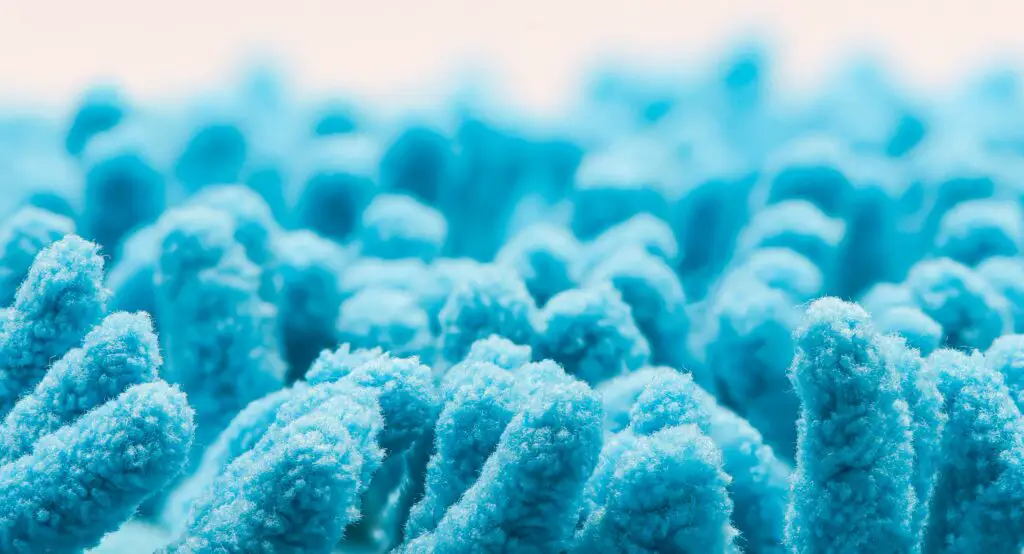

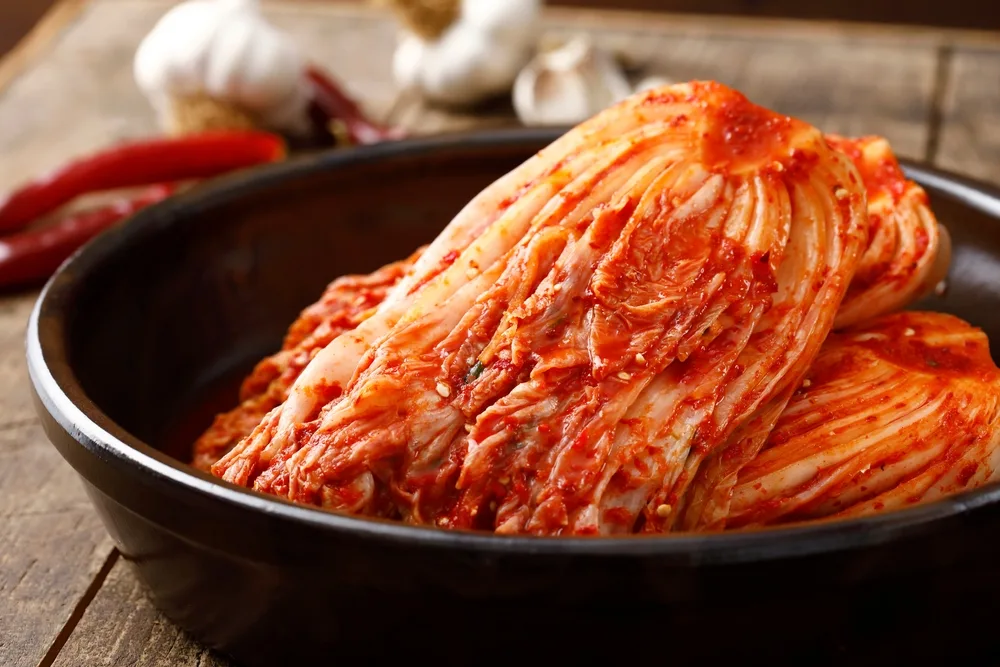


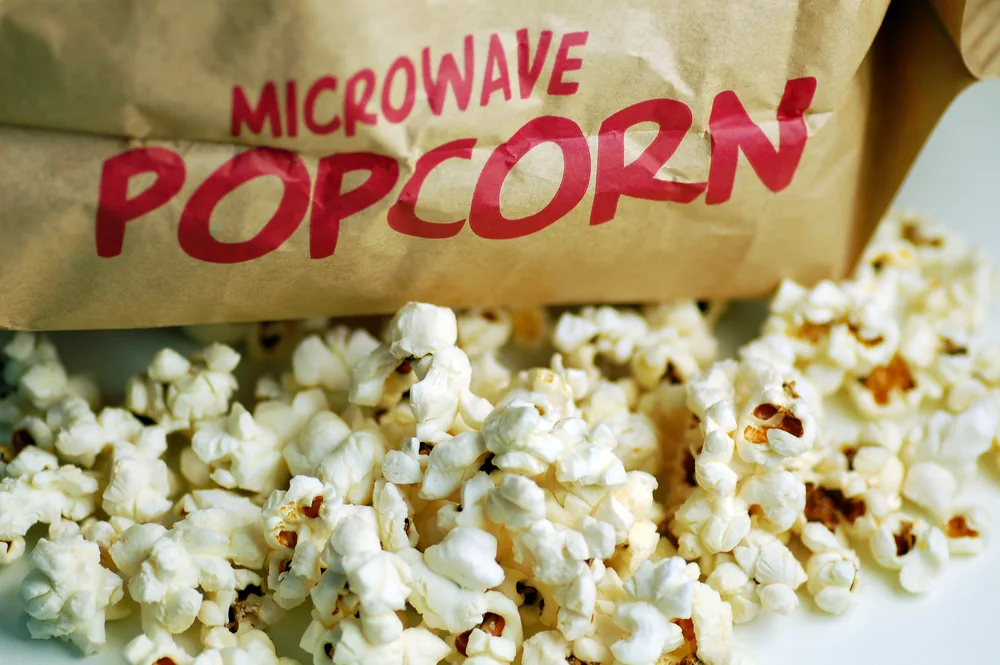




Comments
0